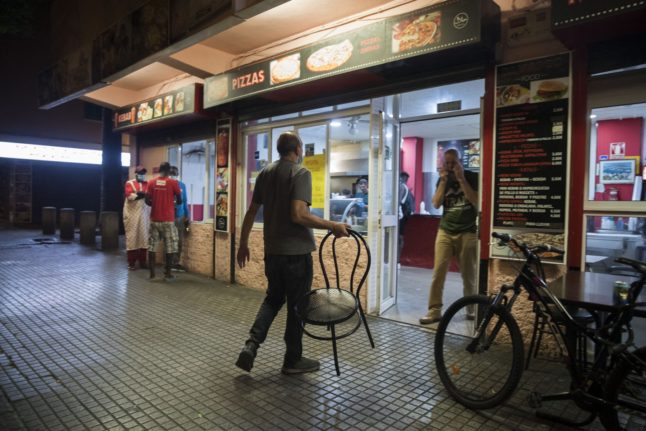Regularly denounced by unions, Spain’s working hours hit the headlines this week after some highly critical remarks by Labour Minister Yolanda Díaz.
READ MORE: Spain’s Labour Minister calls time on ‘mad’ late-night dining
“It is unreasonable that a country should have its restaurants open until 1:00 am. It’s crazy to keep extending the working day indefinitely,” said Díaz, head of the radical left-wing Sumar which is part of Spain’s Socialist-led coalition.
“It’s clear that the working hours in Spain are very different” from the rest of Europe, but “from 10:00 pm, these are night hours which present certain risks” for employees’ mental health, said Díaz, a lawyer with roots in the Communist Party and who specialises in employment law.
Her remarks to a group of journalists on Tuesday, sparked a backlash from the right, who immediately pounced on her remarks as advocating a boring, stay-at-home lifestyle.
Díaz wants “everyone to go home and read the Communist manifesto by lamplight with a cup of tea,” ironised Alfonso Serrano of the right-wing opposition Popular Party.
“Spain has the best nightlife in the world, with its streets full of life and freedom. They want to turn all of us into socialist puritans, with no soul, no light and no restaurants,” jeered Isabel Díaz Ayuso, Madrid’s hardline right-wing regional leader.
And their point was quickly echoed by the nightlife industry.
“We reject any proposal which questions Spanish lifestyle, which distinguishes and sets us apart in the tourist market,” said España de Noche (Spain at Night), an association representing the Spanish nightlife sector.

Long, draw-out hours
According to Eurostat, the number of weekly working hours in Spain is in line with the European average. But the day is more spread out and ends later, Spain being the European country with the most people working after 6:00 pm.
“The problem is that working hours can be very spread out throughout the day” with long lunch breaks that don’t give workers time “to organise their personal lives properly,” Alfonso Serrano, a labour law expert at Alicante University told AFP.
That’s linked to Spain’s traditional way of life where people dine late, often at 10:00 pm, he said, meaning they have “even later leisure hours” which has a “knock-on effect” on other sectors, notably shops which end up closing late.
Díaz started a debate on the issue in 2022 in connection with a draft bill on “use of working time”, commissioning a report from 60 experts who recommended consolidating working hours and closing shops earlier.
The bill was ultimately put on hold because of the July 2023 snap elections, but Díaz reopened the debate during talks on reducing the working week from 40 to 37.5 hours as outlined in Sumar’s coalition agreement with the Socialists.
But it’s a tricky proposal in a country which is proud of its nightlife.
The risk is that Spain ends up being “more boring than the Nordic countries, where you go home at 6:00 pm because nothing is open,” warned José Luis Yzuel, head of Hosteleria de España, which represents the hotel and restaurant industry.
For Miguel Basterra, one of the experts involved in writing the report commissioned by Díaz, bars and restaurants “are responding to a demand in the market” which complicates the issue.
But improvements are “possible”, he said, notably ensuring a better application of “laws and collective labour agreements” which are being sidestepped by some players in the sector.



 Please whitelist us to continue reading.
Please whitelist us to continue reading.
Member comments